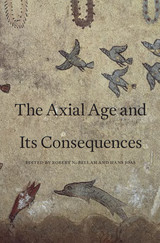
The first classics in human history—the early works of literature, philosophy, and theology to which we have returned throughout the ages—appeared in the middle centuries of the first millennium bce. The canonical texts of the Hebrew scriptures, the philosophical writings of Plato and Aristotle, the Analects of Confucius and the Daodejing, the Bhagavad Gita and the teachings of the Buddha—all of these works came down to us from the compressed period of history that Karl Jaspers memorably named the Axial Age.
In The Axial Age and Its Consequences, Robert Bellah and Hans Joas make the bold claim that intellectual sophistication itself was born worldwide during this critical time. Across Eurasia, a new self-reflective attitude toward human existence emerged, and with it an awakening to the concept of transcendence. From Axial Age thinkers we inherited a sense of the world as a place not just to experience but to investigate, envision, and alter through human thought and action.
Bellah and Joas have assembled diverse scholars to guide us through this astonishing efflorescence of religious and philosophical creativity. As they explore the varieties of theorizing that arose during the period, they consider how these in turn led to utopian visions that brought with them the possibility of both societal reform and repression. The roots of our continuing discourse on religion, secularization, inequality, education, and the environment all lie in Axial Age developments. Understanding this transitional era, the authors contend, is not just an academic project but a humanistic endeavor.
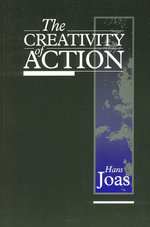
Joas argues for adding a third model of action to the two predominant models of rational and normative action—one that emphasizes the creative character of human action. This model encompasses the other two, allowing for a more comprehensive theory of action. Joas elaborates some implications of his model for theories of social movements and social change and for the status of action theory in sociology in the face of competition from theories advanced by Luhmann and Habermas.
The problem of action is of crucial importance in both sociology and philosophy, and this book—already widely debated in Germany—will add fresh impetus to the lively discussions current in the English-speaking world.

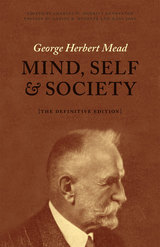
This collection gets to the heart of Mead’s meditations on social psychology and social philosophy. Its penetrating, conversational tone transports the reader directly into Mead’s classroom as he teases out the genesis of the self and the nature of the mind. The book captures his wry humor and shrewd reasoning, showing a man comfortable quoting Aristotle alongside Alice in Wonderland.
Included in this edition are an insightful foreword from leading Mead scholar Hans Joas, a revealing set of textual notes by Dan Huebner that detail the text’s origins, and a comprehensive bibliography of Mead’s other published writings. While Mead’s lectures inspired hundreds of students, much of his brilliance has been lost to time. This new edition ensures that Mead’s ideas will carry on, inspiring a new generation of thinkers.
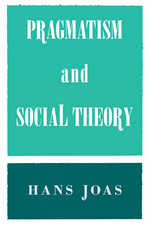
Along with pragmatism's impact on American sociology and social research from 1895 to the 1940s, Joas traces its reception by French and German traditions during this century. He explores the influences of pragmatism—often misunderstood—on Emile Durkheim's sociology of knowledge, and on German thought, with particularly enlightening references to its appropriation by Nazism and its rejection by neo-Marxism. He also explores new currents of social theory in the work of Habermas, Castoriadis, Giddens, and Alexander, fashioning a bridge between Continental thought, American philosophy, and contemporary sociology; he shows how the misapprehension and neglect of pragmatism has led to systematic deficiencies in contemporary social theory.
From this skillful historical and theoretical analysis, Joas creates a powerful case for the enduring legacy of Peirce, James, Dewey, and Mead for social theorists today.
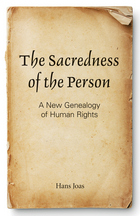
What are the origins of the idea of human rights and universal human dignity? How can we most fully understand—and realize—these rights going into the future? In The Sacredness of the Person, internationally renowned sociologist and social theorist Hans Joas tells a story that differs from conventional narratives by tracing the concept of human rights back to the Judeo-Christian tradition or, alternately, to the secular French Enlightenment. While drawing on sociologists such as Émile Durkheim, Max Weber, and Ernst Troeltsch, Joas sets out a new path, proposing an affirmative genealogy in which human rights are the result of a process of “sacralization” of every human being.
According to Joas, every single human being has increasingly been viewed as sacred. He discusses the abolition of torture and slavery, once common practice in the pre-18th century west, as two milestones in modern human history. The author concludes by portraying the emergence of the UN Declaration of Human Rights of 1948 as a successful process of value generalization. Joas demonstrates that the history of human rights cannot adequately be described as a history of ideas or as legal history, but as a complex transformation in which diverse cultural traditions had to be articulated, legally codified, and assimilated into practices of everyday life. The sacralization of the person and universal human rights will only be secure in the future, warns Joas, through continued support by institutions and society, vigorous discourse in their defense, and their incarnation in everyday life and practice.

Edited by well-respected Mead scholars Hans Joas and Daniel R. Huebner, the volume as a whole makes a coherent statement that places Mead in dialogue with current research, pushing these domains of scholarship forward while also revitalizing the growing literature on an author who has an ongoing and major influence on sociology, psychology, and philosophy.
READERS
Browse our collection.
PUBLISHERS
See BiblioVault's publisher services.
STUDENT SERVICES
Files for college accessibility offices.
UChicago Accessibility Resources
home | accessibility | search | about | contact us
BiblioVault ® 2001 - 2024
The University of Chicago Press









